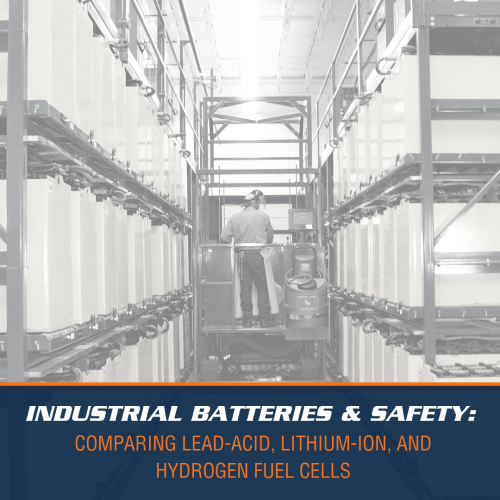We use cookies to make your experience better. To comply with the new e-Privacy directive, we need to ask for your consent to set the cookies. Learn more.
Industrial Batteries and Safety: Comparing Lead-Acid, Lithium-Ion, and Hydrogen Fuel Cells

Electric forklifts continue to gain market share over internal-combustion variants, but the industry is still looking for the next generation of battery power. And while electric forklifts are clearly the material-handling mainstay of the future, batteries remain happily in the present. Newer motive-power technologies — notably lithium ion and hydrogen fuel cells — are available, but they haven’t yet taken hold of the market.
All of these technologies have their advantages and drawbacks. Lithium batteries charge faster than their lead-acid counterparts. Hydrogen fuel cells don’t need to charge at all (instead, they’re refilled). But which power source is the safest?
Here’s a breakdown of all three forklift power types in terms of safety:
Hydrogen Forklifts and Safety
The leading hydrogen fuel cells used in forklifts today feature robust safety controls, including leak monitoring, thermally activated relief valves, and high-pressure tank solenoid valves. Still, any time you pack tremendous energy into a small space, explosions are possible.
In 2018, a hydrogen-powered forklift exploded at a Louisiana manufacturing plant, resulting in six injuries and one fatality. This incident led to lawsuits and falling stock prices for the fuel-cell manufacturer. It also highlights a potential safety risk: Hydrogen and oxygen blend to create a serious explosion hazard. Of course, this was a tragedy, not a trend.
The greater safety issue with hydrogen fuel cells for forklifts, then, is one that most industrial-truck batteries share: They are typically large and heavy. Hydrogen battery replacements, such as those used in industrial trucks, include gas fuel tanks, energy storage cells, safety features, cooling systems, and even, occasionally, ballast to counterweight lifts. Like other industrial batteries, these units cannot be safely handled without adequate battery handling equipment.
Lithium-Ion Forklift Batteries and Safety
Despite repeated trending stories about lithium-ion batteries in cell phones and vape pens exploding, industrial users don’t have much to worry about — as long as they only buy battery packs from trustworthy manufacturers. According to trade publication DC Velocity, “lift truck batteries are different from the ones used in consumer electronics, and reputable battery manufacturers and assemblers are diligent about the safety of these products.”
A high-quality industrial lithium-ion battery pack will feature protection against thermal runaway, the chemical heating process that leads to all those well-publicized explosions. For instance, a battery pack might be designed to shut itself down when heat reaches an upper range.
Lithium-ion technology is also incredibly lightweight for its energy density. That’s why manufacturers use it in personal electronics. And while the low weight could reduce the safety risk associated with handling heavy loads, ironically, it also makes these batteries a poor fit for counterbalance forklifts. Why add ballast when you can get it from a strong, reliable energy source? (We covered our thoughts on the issue in this previous blog post.)
Lead-Acid Forklift Batteries and Safety
We’ve discussed the safety issues surrounding lead-acid industrial batteries frequently in this blog. For instance, here, here, and here. As we’ve stated, an up-to-date battery room operated by trained staff can reliably control the hazards.
The question is: Which is the safest type of battery for a forklift? The answer, of course, is that it’s any battery your staff is trained and equipped to handle. As new technologies emerge, our strongest defense against rising hazards will remain the same: training, adequate equipment, and compliance with safety standards and regulations.
References:
Gooley, Toby. “The allure of lithium-ion.” DCVelocity. Agile Business Media, LLC., 16 Jul. 2015. Web. 20 Jun. 2019.
Vanasse, Harold. “ ” DCVelocity. Agile Business Media, LLC., 28 Sept. 2018. Web. 20 Jun. 2019.
